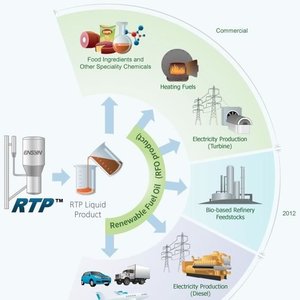Ensyn biocrude receives CARB approvals for refinery coprocessing

Image: Ensyn Corp.
February 9, 2016
BY Ron Kotrba
Ensyn Corp.’s chief technology officer Barry Freel announced the company has been granted key regulatory approvals by California Air Resources Board pursuant to the low carbon fuel standard (LCFS) on the company’s application for its renewable fuel oil (RFO) to be used in coprocessing by California oil refineries. Ensyn, Chevron U.S.A. Inc. and Tesoro Corp. were co-applicants in this process.
Ensyn converts forest residues and other nonfood biomass to a biocrude known as RFO through the application of its proprietary rapid thermal processing (RTP) technology. RTP has been in commercial use for more than 25 years for production of food products, chemicals and heating fuels. The company is now increasing production capacity for a broader commercialization of its fuels business, including refinery coprocessing.
Advertisement
In refinery coprocessing, RFO is processed with fossil crude oil in fluid catalytic crackers, which Ensyn says it has demonstrated in a number of trials, some at operating commercial refineries. Ensyn is commercializing refinery coprocessing in partnership with Honeywell UOP.
The regulatory approvals received from CARB covers the production of both gasoline and diesel by way of RFO coprocessing in specific California refineries using RFO produced at Ensyn’s facility in Ontario from forest residues. The carbon intensity of the resulting renewable gasoline and diesel was determined to be in the range of approximately 20-25 g CO2e/MJ, or approximately 70 percent less than traditional petroleum-based fuels. Ensyn expects that RFO produced at locations closer to the refineries will have reduced carbon intensity due to lower transportation impacts.
Advertisement
“We are very pleased to see these regulatory pathways confirmed,” said CJ Warner, executive vice president of strategy and business development at Tesoro. “These approvals help support and validate our plans to process these renewable feedstocks using our existing infrastructure to produce less carbon-intensive fuels and help lower the cost of compliance with LCFS requirements in California.”
Veronica May, vice president and general manager of Honeywell UOP’s renewable energy and chemicals business, said, “We congratulate Ensyn, Chevron and Tesoro on securing these regulatory pathways. We believe refinery coprocessing offers refiners a cost-effective and efficient option for integration of cellulosic feedstocks into their operations.”
Related Stories
At the University of Missouri, plant biochemist Jay Thelen is using arabidopsis as a powerful model to explore ways to boost oil production — an important step toward creating more sustainable, plant-based energy sources.
Iowa farmers have a new market opportunity for their 2025 soybean crop. Landus is expanding its Clean Fuel Regulation initiative, made possible by recent policy changes expected to increase Canada's demand for liquid biofuel.
Total U.S. operable biofuels production capacity expanded in May, with gains for renewable diesel and a small decrease for ethanol, according to data released by the U.S. Energy Information Administration. Feedstock consumption was up.
The U.S Department of Energy Bioenergy Technologies Office, in partnership with the Algae Foundation and NREL, on July 21 announced the grand champion and top four winning teams of the 2023 - 2025 U.S. DOE AlgaePrize Competition.
The USDA significantly increased its estimate for 2025-’26 soybean oil use in biofuel production in its latest World Agricultural Supply and Demand Estimates report, released July 11. The outlook for soybean production was revised down.
Upcoming Events










